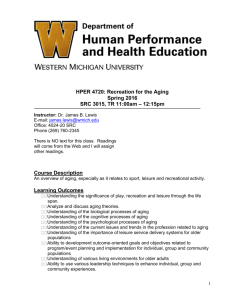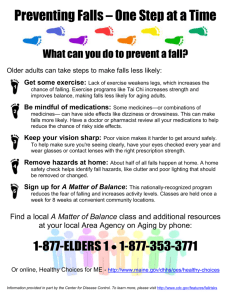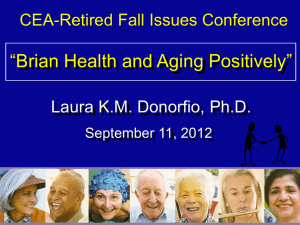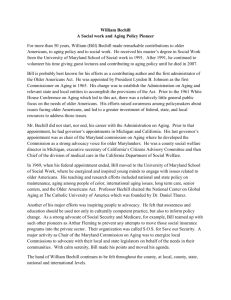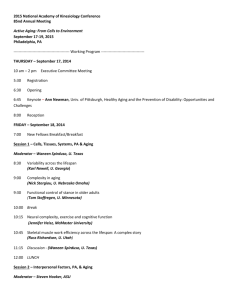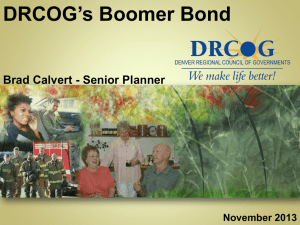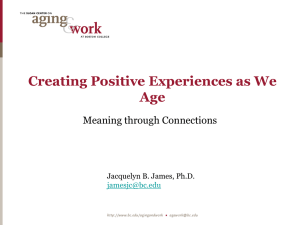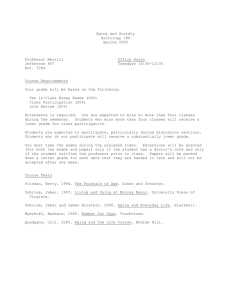Aging and Society
advertisement
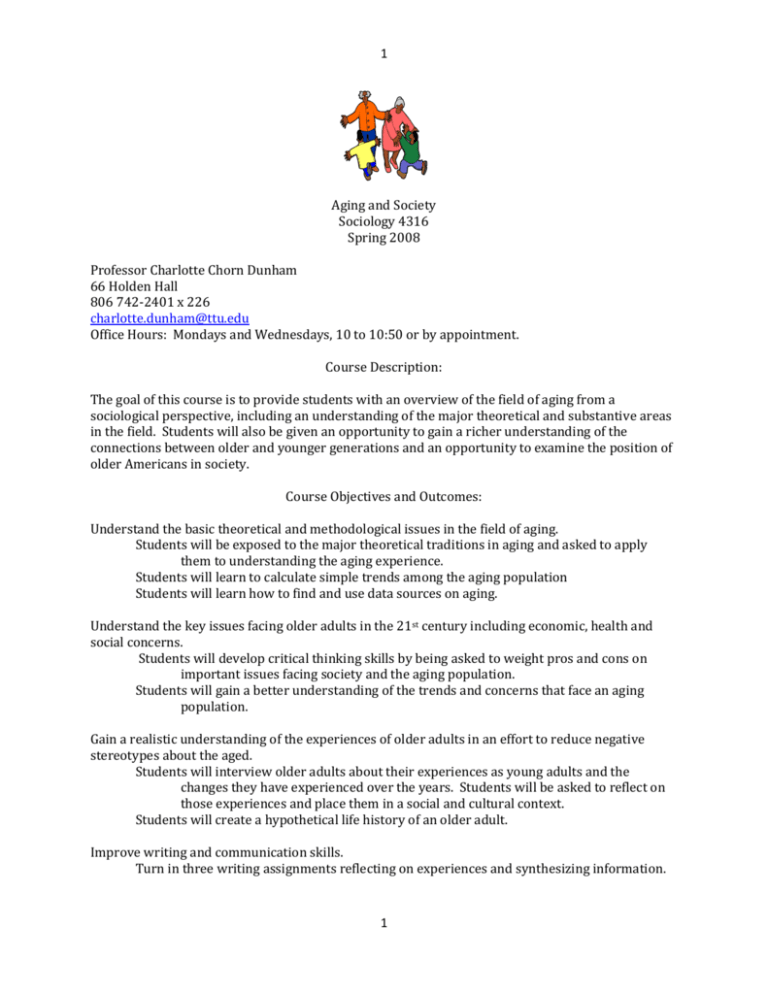
1 Aging and Society Sociology 4316 Spring 2008 Professor Charlotte Chorn Dunham 66 Holden Hall 806 742-2401 x 226 charlotte.dunham@ttu.edu Office Hours: Mondays and Wednesdays, 10 to 10:50 or by appointment. Course Description: The goal of this course is to provide students with an overview of the field of aging from a sociological perspective, including an understanding of the major theoretical and substantive areas in the field. Students will also be given an opportunity to gain a richer understanding of the connections between older and younger generations and an opportunity to examine the position of older Americans in society. Course Objectives and Outcomes: Understand the basic theoretical and methodological issues in the field of aging. Students will be exposed to the major theoretical traditions in aging and asked to apply them to understanding the aging experience. Students will learn to calculate simple trends among the aging population Students will learn how to find and use data sources on aging. Understand the key issues facing older adults in the 21st century including economic, health and social concerns. Students will develop critical thinking skills by being asked to weight pros and cons on important issues facing society and the aging population. Students will gain a better understanding of the trends and concerns that face an aging population. Gain a realistic understanding of the experiences of older adults in an effort to reduce negative stereotypes about the aged. Students will interview older adults about their experiences as young adults and the changes they have experienced over the years. Students will be asked to reflect on those experiences and place them in a social and cultural context. Students will create a hypothetical life history of an older adult. Improve writing and communication skills. Turn in three writing assignments reflecting on experiences and synthesizing information. 1 2 Will improve oral communication skills by making an oral presentation of findings to the class. Required Texts: Quadago, J. Aging and the Life Course. Fourth Edition. Albom, M. Tuesdays with Morrie Course Requirements: Interview an Older Person. 15% of the grade Interview an older family member or friend (at least 70 years old) about their lives when they were in their 20s and 30s. Ask them about the changes they have witnessed since that time. Be sure and ask about such issues as technological change, change in attitudes and values, changes in economic well being and experiences of historical events. Write a 3 to 4 page paper describing their experiences and place them in a social context. Write a Reflection Paper on Tuesdays with Morrie. 15% of the grade Write a two to three page paper giving your reactions to the book. Discuss your specific reactions to the relationship between the younger student and older professor, the issues of death and dying faced by Morrie and lessons learned from the book. Group Project on the Life Course: 30% of the grade. Students will be given a group project to present to the class and produce in written form. Each group will be given a case study of an individual born in one particular decade. For the project, students will: 1) Produce a hypothetical life history/life course for this individual based upon historical, cultural and economic conditions under which they life. 2) Produce a decade review for the decade in which the person was in their 20s in order to gain a deeper understanding of the historical and cultural conditions under which many older adults lived. In this decade review you should have a time line of the significant events of the decade and show how those events may have affected your hypothetical person. You should also give an overview of the cultural and social context of the decade including information about the economic conditions, cultural conditions, relations between women and men and other relevant information. Students will be allowed to choose their own group partners or may be assigned a group if they prefer. The case studies and presentations dates will be drawn by lots. Grading will be based upon 1) the degree of depth of the project; 2) the creativity of the project; and 3) the accuracy of the project. Remember that this is a group assignment. Students who fail to carry their weight may have their grade reduced by 10 points. Exams. There will be three exams (two semester exams and a final). 20% of the grade per exam. 2 3 The exams will be multiple choice/true false with one essay exam. The final exam is optional and can be used to replace your lowest semester exam score. Attendance Points. Those who miss no more than two classes during the semester will receive 2 points added to your final average. Extra Credit: Students may be given the opportunity to earn extra credit points if appropriate university events become available. These opportunities will be announced in class. It is the responsibility of the student to keep informed of these opportunities as they arise. Late Papers. Grades on papers received after 5:00 p.m. on the due date will be reduced by 5 points. WebCt: The exams, paper submissions and grades will all be handled through the WebCt system. Electronically submitted papers will only be accepted through Web CT. The system can be access at hhtp://webct.tltc.ttu.edu. Other Issues: Class Conduct: Since every student is entitled to full participation in class without interruption or distraction, disruption of class with inconsiderate behavior will not be tolerated. This includes turning off all cell phones and beepers before coming to class. It is also distracting to other students to talk in class or read or do other class assignments. Repeated violations will be penalized and may result in expulsion from the class. The attempt of students to present as their own any work that they have not honestly performed and cheating during exams will be treated as a serious offense. For examples of cheating see the University catalogue pages 46 and 47. Students found to commit academic dishonesty will be liable for serious sanctions such as receiving a 0 for the assignment or exam. Students with Disabilities: Any student who, because of a disability, may require special arrangements in order to meet the course requirements should contact the instructor as soon as possible to make any necessary arrangements. Students should present appropriate verification from Student Disability Services during the instructor’s office hours. Please note instructors are not allowed to provide classroom accommodations to a student until appropriate verification from Student Disability Services has been provided. For additional information, you may contact the Student Disability Services office at 335 West Hall or 806-742-2405. Observance of a Religious Holy Day. Texas House Bill 256 requires institutions of higher education to excuse a student from attending classes or other required activities, including examinations, for the observance of a religious holy day. The student shall also be excused for time necessary to travel. An institution may not penalize the student for the absence and allows for the student to take an exam or complete an assignment from which the student is excused. No prior notification of the instructor is required. 3 4 Course Schedule: Week of January 9 Introduction to the course. Week of January 14: Defining the Field: Theories of Aging. Reading: Quadagno. Chapters 1 & 2 Week of January 21: Defining the Field: Demography of Aging. Reading: Quadagno, Chapters 3 & 4. Paper on Interview with Older Adult Due Friday, January 25. Week of January 28: Stereotypes of Age. Week of February 4: Interdisicplinary Perspectives: Global Issues and Aging Week of February 11: Interdisciplinary Perspectives: History and Aging Readings: Quadagno, Chapter 5. Week of February 18: Social Aspects of Aging: Family Relationships and Social Support. Readings: Quadagno, Chapter 8 Exam #1, Friday February 22. Week of February 25 Social Aspects of Aging: Living Arrangements. Readings: Quadagno, Chapter 9. Week of March 3: Social Aspects of Aging: Caring for the Frail Elderly. Readings: Quadagno, Chapter 10 Week of March 10: Managing Transitions: Old Age and the Welfare State. Reading: Quadagno, Chapter 11 Week of March 17: Spring Break Week of March 24: Managing Transitions: Work and Retirement. 4 5 Reading: Quadagno, Chapter 12 Reflection Paper on Tuesdays with Morrie Due Friday, March 28. Week of March 31: Managing Transitions: Health, Health Care and Death and Dying. Reading: Quadagno, Chapters 13 & 14. Week of April 7: Managing Transitions: Aging and Inequality Readings: Quadagno, Chapters 15 & 16. Week of April 14: Exam #2, Monday April 14. Presentations Week of April 21: Presentations Week of April 28 Wrap Up. Final Exam: 1:30 to 4:00, Friday May 2. 5
